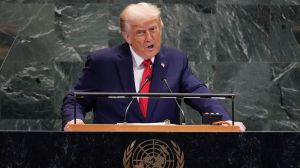In the restive Darjeeling hills, bridges of love hold true
As the Darjeeling Additional Superintendent of Police, these are tough days for Jayanta Pal. His days are spent trying...

As the Darjeeling Additional Superintendent of Police, these are tough days for Jayanta Pal. His days are spent trying to maintain peace as the strife between Gorkhas and Bengalis deepens over the demand for a separate Gorkhaland. At night, he comes home to the other side of the picture: his wife Ongmu is a Gorkha, reflective of the fact that under the cloud of uncertainty and foreboding hanging over the hills, there are stories of love between two communities which have lived together for generations.
Ongmu is an ASP too, deployed with the Darjeeling District Intelligence Unit. For Pal and her, it was love at first sight at the West Bengal Police Training Institute in Barrackpore.
Then there is Dr Debaprasad Choudhury and his wife Sonam, who has even taken on a Bengali name, Sheela. The two have made Darjeeling their home while, irrespective of the current agitation, Pal and Ongmu say they will eventually settle down in either Darjeeling or Siliguri.
Describing how they met, Pal says: “I was graduating in 1990. Ongmu had just come in for training and happened to be one year junior.”
They have retained their different identities through the marriage, and ensured that their children learn to respect both. A Buddhist and deeply religious, Ongmu says she also worships Hindu gods and goddesses. “I have my Bengali puja ghar too.”
Their daughter Irandati, who is also fondly called Oshin (Japanese for a lovable person) studies in Class VII, while son Pablo or Aranyak is in Class IV. They speak both Nepali and Bengali like their parents.
Apart from being an avid painter — he hopes to hold his first exhibition of collages in August — Pal is also interested in rare hill plants. Certain varieties of magnolia and maple, believed to be nearly extinct, are his latest find. Pal wants to plant as many of these as possible during his current stint in the district.
Dr Choudhury and Sheela’s love story bloomed in the North Bengal Medical College in 1976, when he was doing his internship there and she was a nurse. “The courtship continued for two years and I would often go up the hills to Darjeeling to meet Sonam,” he recalls.
Sonam says both families were initially opposed to the marriage. “But when they found us determined to carry forward the relationship, my shashuri (mother-in-law) came to Darjeeling and gave us her blessings,” she says. “For me, it was like taking a plunge into the sea. I did not know anything of Bengali culture. I only believed in the doctor’s love for me. But gradually, I have fully adopted the culture, so much so that now I can even speak Chattagram Bengali, that is supposed to be very tough, and can cook Chatgaon dishes.”
Sonam Doma Bhutia changed her name to Sheela Choudhury after a wedding with full Bengali customs on February 19, 1979. She also resigned her job at the North Bengal Medical College. However, insists Sheela, the sacrifice has not been in vain. While their one daughter Doel is a doctor based in Delhi, Titir is studying to be one.
As the Gorkhaland demand raises tension between the two communities, Sheela says she prays everyday for this “dark period” to get over.
Her fears are not unfounded. Since the first Gorkhaland agitation, the number of Bengalis in Darjeeling has been steadily dwindling, from 10 per cent of the total a couple of decades ago to less than 1 per cent now. A local Bengali association says there are no more than 250 Bengali families remaining in Darjeeling.
Photos



- 01
- 02
- 03
- 04
- 05




























